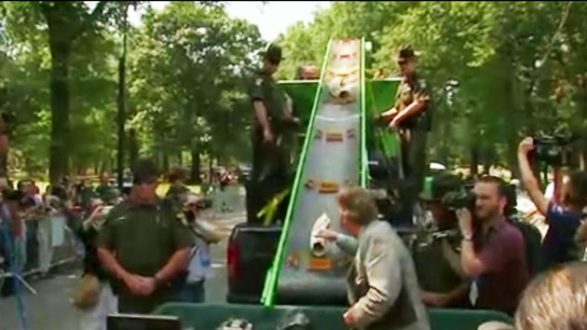
ABC News(NEW YORK) — In an ongoing group effort to combat the illegal ivory trade, more than a ton of ivory was crushed in Central Park on Thursday.
The New York State Department of Environmental Conservation [DEC] partnered with some of the world’s most prominent public and private wildlife conservation groups to crush stores of illegal ivory confiscated by state law enforcement.
The crushed items included an array of objects made from ivory — tusks, trinkets, statues, jewelry and other decorative pieces — worth an estimated $8.5 million dollars. The ivory was destroyed to send a clear message that the state will not tolerate trading of the material made from precious elephant tusks. Ivory has historically been collected by poachers who kill the elephants to collect their tusks, a practice that threatens Africa’s dwindling elephant population.
Several groups were involved, including the International Fund for Animal Welfare [IFAW] which lobbies against the ivory trade and the killing of elephants.
Wildlife advocate and music legend Mick Fleetwood has been as an IFAW ambassador for many years and helped pass a state bill in Hawaii last year that cracks down on ivory trafficking.
“In the last four or five years I’ve become part of a process which is aware and becoming more aware and more desperately trying to do something, to whatever avail I can do. That’s what this is about,” Fleetwood told ABC News. Fleetwood added that his ex-wife Lynn, who stood by his side in Central Park, brought him into the fold as an advocate in their home state of Hawaii, one of the top three ivory markets in the U.S.
“Hawaii was one of seven different states that have passed legislation banning the sale of ivory,” Jeffrey Flocken the IFAW North American Regional Director said. “These laws are going to stop ivory from coming in and being sold in the major markets that existed before.”
Bans on the ivory trade have been passed in several states that were top markets for ivory — New York, New Jersey, California and Hawaii. Advocacy groups, including IFAW, are advocating for stronger wildlife protections and initiatives on both the federal and state levels.
They say symbolic events like the ivory crush in Central Park send a powerful and emotional message about the dangers of hunting wildlife for trophies, like ivory, and the need to stop the demand.
“Every piece of these [almost two] tons of ivory today that are crushed will never end up back out on markets, it won’t be part of the problem,” Flocken said. “It won’t get to perpetuate this myth that ivory has value as pieces of jewelry and statues. The real value for ivory is on living elephants in the wild. And that’s the statement that’s being made today by Mick, by the people that are here and by the agencies.”
African elephant populations have declined 60 percent since the U.S. Fish and Wildlife Service (FWS) listed them as threatened in 1978. Between 2005 and 2014, trophy hunters imported parts of 4,600 African elephants to the U.S., according to IFAW.
The ivory destroyed in Central Park would be equivalent to the tusks of 100 elephants, which evoked emotion from participants in the event.
“This is a living example of a tragedy in progress and I know why I’m here,” Fleetwood said staring at the piles of illegal ivory. “This is an extreme reminder of how sad and tragic this situation is. Having said that, there should be a spirit that draws a line in the sand saying this has to stop.”
In addition to the the New York DEC, IFAW and Wildlife Conservation Society, over a dozen other groups that work to save animals, with support from Tiffany and Co., joined the event to raise awareness of the poaching crisis and ivory trade.
Copyright © 2017, ABC Radio. All rights reserved.










